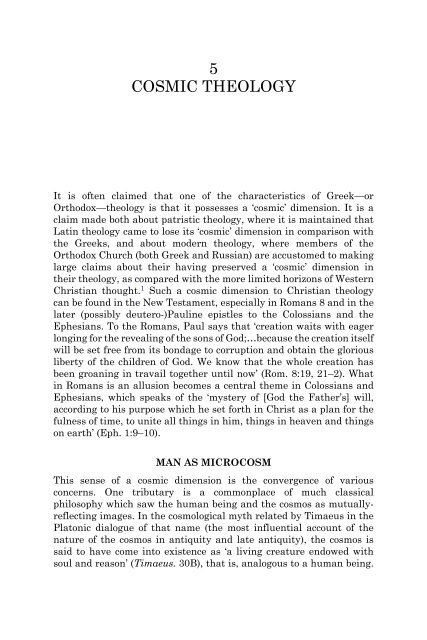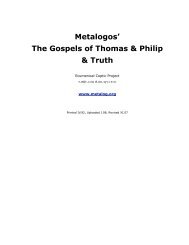Andrew Louth - Syriac Christian Church
Andrew Louth - Syriac Christian Church
Andrew Louth - Syriac Christian Church
Create successful ePaper yourself
Turn your PDF publications into a flip-book with our unique Google optimized e-Paper software.
5<br />
COSMIC THEOLOGY<br />
It is often claimed that one of the characteristics of Greek—or<br />
Orthodox—theology is that it possesses a ‘cosmic’ dimension. It is a<br />
claim made both about patristic theology, where it is maintained that<br />
Latin theology came to lose its ‘cosmic’ dimension in comparison with<br />
the Greeks, and about modern theology, where members of the<br />
Orthodox <strong>Church</strong> (both Greek and Russian) are accustomed to making<br />
large claims about their having preserved a ‘cosmic’ dimension in<br />
their theology, as compared with the more limited horizons of Western<br />
<strong>Christian</strong> thought. 1 Such a cosmic dimension to <strong>Christian</strong> theology<br />
can be found in the New Testament, especially in Romans 8 and in the<br />
later (possibly deutero-)Pauline epistles to the Colossians and the<br />
Ephesians. To the Romans, Paul says that ‘creation waits with eager<br />
longing for the revealing of the sons of God;…because the creation itself<br />
will be set free from its bondage to corruption and obtain the glorious<br />
liberty of the children of God. We know that the whole creation has<br />
been groaning in travail together until now’ (Rom. 8:19, 21–2). What<br />
in Romans is an allusion becomes a central theme in Colossians and<br />
Ephesians, which speaks of the ‘mystery of [God the Father’s] will,<br />
according to his purpose which he set forth in Christ as a plan for the<br />
fulness of time, to unite all things in him, things in heaven and things<br />
on earth’ (Eph. 1:9–10).<br />
MAN AS MICROCOSM<br />
This sense of a cosmic dimension is the convergence of various<br />
concerns. One tributary is a commonplace of much classical<br />
philosophy which saw the human being and the cosmos as mutuallyreflecting<br />
images. In the cosmological myth related by Timaeus in the<br />
Platonic dialogue of that name (the most influential account of the<br />
nature of the cosmos in antiquity and late antiquity), the cosmos is<br />
said to have come into existence as ‘a living creature endowed with<br />
soul and reason’ (Timaeus. 30B), that is, analogous to a human being.




